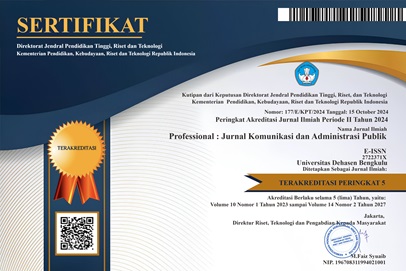Analisis Retorik Pidato Politik Megawati Soekarno Putri Pada Peringatan Ke-50 Tahun PDI-P
Abstract
Megawati Soekarno Putri's existence on the Indonesian political stage has been going on for more than two decades. During this period, Megawati has managed to maintain her position as a charismatic female political figure. Despite public doubts about her figure, Megawati is the de facto leader of one of the largest parties, as well as the only female president who has ever led the Republic of Indonesia. As a politician who has a strong character, Megawati has never escaped the media spotlight. Through her various controversial statements, Megawati's remarks are cited as a hot topic of discussion in the media. Reflecting on his charisma and rhetorical power, Megawati's speech is an interesting rhetorical phenomenon to analyze. Speech by Megawati Soekarno Putri on the Birthday of the Indonesian Democratic Party – Struggle (PDI Perjuangan), was a form of ceremonial speech filled with political messages. Megawati's speech was delivered in a heated political atmosphere, ahead of the contestation moment for the 2024 Presidential Election. This study aims to analyze the rhetorical strategy used by Megawati to reveal the implicit meaning contained in it. Referring to the rhetorical analysis method, the results of the study show that Megawati's speech applies the typical communication style of female leaders. Apart from that, Megawati's speech also applied a rhetorical strategy that was oriented towards emphasizing aspects of personal identity as a descendant of Bung Karno, authority as chairman of the PDI-P, and his superiority over President Jokowi as his cadre. Megawati's rhetorical strategy also shows that she is not an inferior female leader.
Downloads
Copyright (c) 2023 Denny Indra Rachmawan

This work is licensed under a Creative Commons Attribution-ShareAlike 4.0 International License.





